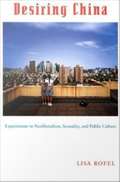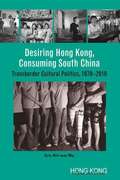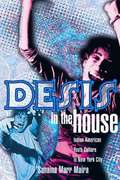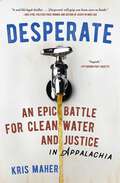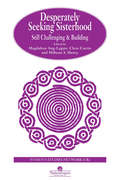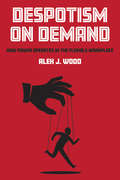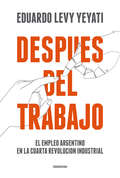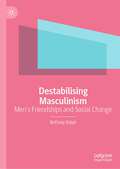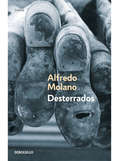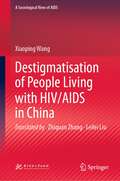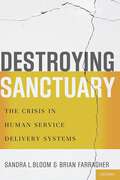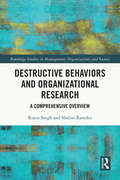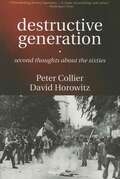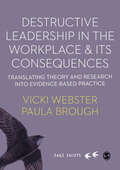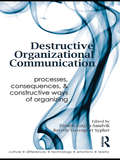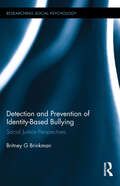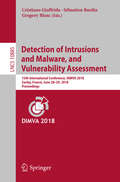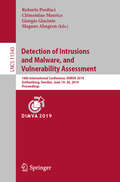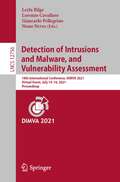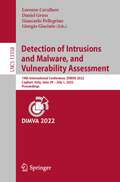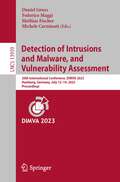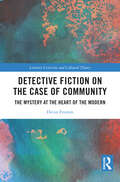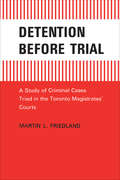- Table View
- List View
Desiring China: Experiments in Neoliberalism, Sexuality, and Public Culture
by Lisa RofelThrough window displays, newspapers, soap operas, gay bars, and other public culture venues, Chinese citizens are negotiating what it means to be cosmopolitan citizens of the world, with appropriate needs, aspirations, and longings. Lisa Rofel argues that the creation of such "desiring subjects" is at the core of China's contingent, piece-by-piece reconfiguration of its relationship to a post-socialist world. In a study at once ethnographic, historical, and theoretical, she contends that neoliberal subjectivities are created through the production of various desires--material, sexual, and affective--and that it is largely through their engagements with public culture that people in China are imagining and practicing appropriate desires for the post-Mao era. Drawing on her research over the past two decades among urban residents and rural migrants in Hangzhou and Beijing, Rofel analyzes the meanings that individuals attach to various public cultural phenomena and what their interpretations say about their understandings of post-socialist China and their roles within it. She locates the first broad-based public debate about post-Mao social changes in the passionate dialogues about the popular 1991 television soap opera Yearnings. She describes how the emergence of gay identities and practices in China reveals connections to a transnational network of lesbians and gay men at the same time that it brings urban/rural and class divisions to the fore. The 1999-2001 negotiations over China's entry into the World Trade Organization; a controversial women's museum; the ways that young single women portray their longings in relation to the privations they imagine their mothers experienced; adjudications of the limits of self-interest in court cases related to homoerotic desire, intellectual property, and consumer fraud--Rofel reveals all of these as sites where desiring subjects come into being.
Desiring Hong Kong, Consuming South China
by Eric Kit-wai MaA study of the complex and changing cultural patterns in Hong Kong's relationship with the neighbouring mainland. From interviews, TV dramas, media representations and other sources, it traces the fading of Hong Kong's once-influential position as a role model for less developed mainland cities and explores changing perceptions as China grows in confidence and Hong Kong encounters a powerful nation culture in the mainland.
Desis In The House: Indian American Youth Culture In New York City
by Maira Sunaina MarrShe sports a nose-ring and duppata (a scarf worn by South Asian women) along with the latest fashion in slinky club wear; he's decked out in Tommy gear. Their moves on the crowded dance floor, blending Indian film dance with break-dancing, attract no particular attention. They are just two of the hundreds of hip young people who flock to the desi (i. e. , South Asian) party scene that flourishes in the Big Apple. New York City, long the destination for immigrants and migrants, today is home to the largest Indian American population in the United States. Coming of age in a city remarkable for its diversity and cultural innovation, Indian American and other South Asian youth draw on their ethnic traditions and the city's resources to create a vibrant subculture. Some of the city's hottest clubs host regular bhangra parties, weekly events where young South Asians congregate to dance to music that mixes rap beats with Hindi film music, bhangra (North Indian and Pakistani in origin), reggae, techno, and other popular styles. Many of these young people also are active in community and campus organizations that stage performances of "ethnic cultures. " In this book Sunaina Maira explores the world of second-generation Indian American youth to learn how they manage the contradictions of gender roles and sexuality, how they handle their "model minority" status and expectations for class mobility in a society that still racializes everyone in terms of black or white. Maira's deft analysis illuminates the ways in which these young people bridge ethnic authenticity and American "cool. "
Desperate Magic
by Valerie KivelsonIn the courtrooms of seventeenth-century Russia, the great majority of those accused of witchcraft were male, in sharp contrast to the profile of accused witches across Catholic and Protestant Europe in the same period. While European courts targeted and executed overwhelmingly female suspects, often on charges of compacting with the devil, the tsars' courts vigorously pursued men and some women accused of practicing more down-to-earth magic, using poetic spells and home-grown potions. Instead of Satanism or heresy, the primary concern in witchcraft testimony in Russia involved efforts to use magic to subvert, mitigate, or avenge the harsh conditions of patriarchy, serfdom, and social hierarchy. Broadly comparative and richly illustrated with color plates, Desperate Magic places the trials of witches in the context of early modern Russian law, religion, and society. Piecing together evidence from trial records to illuminate some of the central puzzles of Muscovite history, Kivelson explores the interplay among the testimony of accusers, the leading questions of the interrogators, and the confessions of the accused. Assembled, they create a picture of a shared moral vision of the world that crossed social divides. Because of the routine use of torture in extracting and shaping confessions, Kivelson addresses methodological and ideological questions about the Muscovite courts' equation of pain and truth, questions with continuing resonance in the world today. Within a moral economy that paired unquestioned hierarchical inequities with expectations of reciprocity, magic and suspicions of magic emerged where those expectations were most egregiously violated. Witchcraft in Russia surfaces as one of the ways that oppression was contested by ordinary people scrambling to survive in a fiercely inequitable world. Masters and slaves, husbands and wives, and officers and soldiers alike believed there should be limits to exploitation and saw magic deployed at the junctures where hierarchical order veered into violent excess.
Desperate: An Epic Battle for Clean Water and Justice in Appalachia
by Kris MaherSet in Appalachian coal country, this &“superb&” (Pittsburgh Post-Gazette) legal drama follows one determined lawyer as he faces a coal industry giant in a seven-year battle over clean drinking water for a West Virginia community.For two decades, the water in the taps and wells of Mingo County didn&’t look, smell, or taste right. Could the water be the root of the health problems—from kidney stones to cancer—in this Appalachian community? Environmental lawyer Kevin Thompson certainly thought so. For seven years, Thompson waged an epic legal battle against Massey Energy, West Virginia&’s most powerful coal company, helmed by CEO Don Blankenship. While Massey&’s lawyers worked out of a gray glass office tower in Charleston known as &“the Death Star,&” Thompson set up shop in a ramshackle hotel in the fading coal town of Williamson. Working with fellow lawyers and a crew of young activists, Thompson would eventually uncover the ruthless shortcuts that put the community&’s drinking water at risk. Retired coal miners, women whose families had lived in the area&’s coal camps for generations, a respected preacher and his brother, all put their trust in Thompson when they had nowhere else to turn. Desperate is a masterful work of investigative reporting about greed and denial, &“both a case study in exploitation of the little guy and a playbook for confronting it&” (Kirkus Reviews). Maher crafts a revealing portrait of a town besieged by hardship and heartbreak, and an inspiring account of one tenacious environmental lawyer&’s mission to expose the truth and demand justice.
Desperately Seeking Sisterhood: Still Challenging And Building
by Magdalene Ang-Lygate;Chris Corrin;Millsom S. HenryFirst Published in 1997. A collection of contributions from feminist researchers who attended the annual Women's Studies Network WSN conference in June 1995. Emphasizing theory, practice and campaigning, chapters seek to address contemporary issues from different perspectives - theoretical, practical and strategic.
Despotism on Demand: How Power Operates in the Flexible Workplace
by Alex J. WoodDespotism on Demand draws attention to the impact of flexible scheduling on managerial power and workplace control. When we understand paid work as a power relationship, argues Alex J. Wood, we see how the spread of precarious scheduling constitutes flexible despotism; a novel regime of control within the workplace.Wood believes that flexible despotism represents a new domain of inequality, in which the postindustrial working class increasingly suffers a scheduling nightmare. By investigating two of the largest retailers in the world he uncovers how control in the contemporary "flexible firm" is achieved through the insidious combination of "flexible discipline" and "schedule gifts." Flexible discipline provides managers with an arbitrary means by which to punish workers, but flexible scheduling also requires workers to actively win favor with managers in order to receive "schedule gifts": more or better hours. Wood concludes that the centrality of precarious scheduling to control means that for those at the bottom of the postindustrial labor market the future of work will increasingly be one of flexible despotism.
Después del trabajo: El empleo argentino en la cuarta Revolución Industrial
by Eduardo Levy Yeyati¿Hay vida después del trabajo? Con optimismo o desesperanza, con retórica académica o de charla de café, hace tiempo sabemos, escuchamos o intuimos que el trabajo, como lo conocemos, seguirá siendo desplazado por la tecnología. ¿Preocupación "de países desarrollados"? Cada vez tenemos más evidencia para afirmar que no: la pregunta por el futuro del empleo en la Argentina no solo es relevante, también es urgente. Y tal vez no se trate de si seremos reemplazados por robots y cuándo, sino de discutir las consecuencias de una sustitución inevitable sobre nuestro bienestar y nuestra cultura. ¿Somos capaces de convertir progreso tecnológico en herramienta liberadora? Este libro apuesta a esa posibilidad y brinda los insumos para pensarla y formularla en términos de política pública. Basado en una investigación sin precedentes, traza un mapa del trabajo en la Argentina de hoy, presenta sus perspectivas a futuro y, sobre todo, invita a entender las consecuencias de un cambio de dimensiones históricas que golpea cada vez más cerca de casa.
Destabilising Masculinism: Men’s Friendships and Social Change
by Brittany RalphThis book explores how two generations of relatively privileged Australian men have navigated the complex terrain of same-gender friendship across their lives, to offer both empirically unique and theoretically significant insights into the mechanics of social change in masculinities. Applying a feminist poststructuralist lens to data from in-depth interviews with 14 pairs of fathers and sons, it details how masculinist discourses of emotion and intimacy have governed the participants’ friendship practices at three chronological timepoints: fathers’ early lives and later lives, and sons’ early lives. A clear but complicated shift emerges, such that the commitment to stoicism and self-reliance dominant in the fathers’ early lives has given way to a growing embrace of intimacy and emotional expression within their and their son's contemporary same-gender friendships. Engaging with key debates in the field of critical studies on men and masculinities (CSMM), this book offers an alternative to the conceptualisation of this positive change as either representative of a holistic disintegration of hegemonic structures, or a superficial behavioural shift that is largely inconsequential to the gender order. Rather, it illustrates that the increasing influence of feminist, queer-inclusion and therapeutic discourse has destabilised masculinism in the context of men’s friendships, offering men an alternative subject position that allows care, expressiveness and intimacy. This book will be of interest to scholars in Gender and Sexuality Studies, and Masculinity Studies.
Desterrados
by Bravo Alfredo Molano«Cuando mataron a Jaime Garzón admití que no podía regresar pronto, conseguí una mesa de trabajo grande, alé la pluma y comencé a escribir este libro. Al terminarlo comprendí agachando la cabeza en señal de profundo respeto que el drama de mi exilio, a pesar de sus dolores, es un pálido reflejo de la auténtica tragedia que viven a diario millones de colombianos desterrados, exiliados en su propio país. Creo, con ellos, que sólo un acuerdo político profundo permitirá echar las bases de una verdadera democracia; la guerra no tendría resultado distinto a la dictadura de los vencedores».Alfredo Molano
Destigmatisation of People Living with HIV/AIDS in China (A Sociological View of AIDS)
by Xiaoping WangAfter reviewing related theories on stigmatisation of people living with HIV/AIDS (PLWHA), this book applies social exclusion theory, actor theory and stigma theory to the study of social mechanisms of stigmatisation of PLWHA in China to show the influence and mechanism of stigmatisation on them, and tries to construct the policy framework to tackle stigmatisation from the perspective of welfare pluralism. Qualitative analysis was used and data was obtained during the field interview. Thirty PLWHA and seventeen healthy people (non-infected people and staff of ASO Service Organizations) were selected by using random sampling and snowball sampling for semi-structured depth interviews. The research examines the treatments and living conditions of those PLWHA, aiming to explore the influence of HIV on them in education, employment, medical care, economy, welfare and social relations. The book is intended for graduate students, researchers interested in this field and relevant policymakers.
Destroying Sanctuary: The Crisis In Human Service Delivery Systems
by Sandra L. BloomFor the last thirty years, the nation's mental health and social service systems have been under relentless assault, with dramatically rising costs and the fragmentation of service delivery rendering them incapable of ensuring the safety, security, and recovery of their clients. The resulting organizational trauma both mirrors and magnifies the trauma-related problems their clients seek relief from. Just as the lives of people exposed to chronic trauma and abuse become organized around the traumatic experience, so too have our social service systems become organized around the recurrent stress of trying to do more under greater pressure: they become crisis-oriented, authoritarian, disempowered, and demoralized, often living in the present moment, haunted by the past, and unable to plan for the future. <p><p> Complex interactions among traumatized clients, stressed staff, pressured organizations, and a social and economic climate that is often hostile to recovery efforts recreate the very experiences that have proven so toxic to clients in the first place. Healing is possible for these clients if they enter helping, protective environments, yet toxic stress has destroyed the sanctuary that our systems are designed to provide. <p><p> This thoughtful, impassioned critique of business as usual begins to outline a vision for transforming our mental health and social service systems. Linking trauma theory to organizational function, Destroying Sanctuary provides a framework for creating truly trauma-informed services. The organizational change method that has become known as the Sanctuary Model lays the groundwork for establishing safe havens for individual and organizational recovery. The goals are practical: improve clinical outcomes, increase staff satisfaction and health, increase leadership competence, and develop a technology for creating and sustaining healthier systems. Only in this way can our mental health and social service systems become empowered to make a more effective contribution to the overall health of the nation. <p><p> Destroying Sanctuary is a stirring call for reform and recovery, required reading for anyone concerned with removing the formidable barriers to mental health and social services, from clinicians and administrators to consumer advocates.
Destructive Behaviors and Organizational Research: A Comprehensive Overview (Routledge Studies in Management, Organizations and Society)
by Riann Singh Shalini RamdeoDestructive organizational behaviors including destructive leadership, abusive supervision, workplace bullying, sexual harassment in the workplace, workplace deviance, workplace incivility, workplace ostracism, social loafing, and workplace discrimination and injustice are explored in this book. These destructive organizational behaviors and negative perspectives have emerged as the most pervasive forms of mistreatment in today’s workplace with the most costly and disastrous consequences across all levels: employees, teams, and organizations. This volume synthesizes and critically evaluates existing research and identifies future directions through research gaps on the most destructive organizational behaviors in today’s workplace. Strategies for managing such behaviors and potential contextual variations in destructive behaviors are also assessed. Alternative negative perspectives on traditionally positive organizational behaviors are examined. There is a paucity of research on the darker side of organizational behaviors, although such destructive behaviors are indeed pervasive in today’s workplace. Providing researchers with a comprehensive overview and analysis of research advances on selected destructive organizational behaviors, this book also considers the need of researchers to delineate future research opportunities to advance the field of study. It seeks to spur critical thinking, spark alternative research perspectives, and provide the foundation from which focused future research can develop. It also considers managerial and international perspectives through an assessment of strategies for managing destructive behaviors and contextual reflections on destructive organizational behaviors, making it a valuable resource for researchers, academics, and students in the fields of organizational behavior, psychology, management, leadership and strategy.
Destructive Generation: Second Thoughts About the Sixties
by Peter Collier David HorowitzAs leading New Leftists in the Sixties, Peter Collier and David Horowitz were intimately involved in the radicalism of the day. Later on, they became the first of their generation to publicly reject the objectives of that revolutionary era and point out the cultural chaos it had left behind. <p><p>Part memoir, part political analysis, part social history, DESTRUCTIVE GENERATION is the compelling story of their intellectual journey into and out of the radical trenches. Telling stories of the New Left's most famous (and infamous) personalities and events, Collier and Horowitz reveal the destructive legacy of the Sixties and the way in which that decade continues to cast a long shadow over politics and culture today. <p><p>When it was first published more than a decade ago, DESTRUCTIVE GENERATION was a controversial bestseller that some critics compared to Whittaker Chambers' powerful political testament, WITNESS. This new edition contains new material which makes this classic work more relevant than ever in our own divided time.
Destructive Leadership in the Workplace and its Consequences: Translating theory and research into evidence-based practice (SAGE Swifts)
by Paula brough Vicki WebsterWith relevance across public, private and not-for-profit sectors, and combining perspectives from both the business and psychology worlds, this book is a cross-disciplinary look at how destructive leaders can impact organisations and their workers, and how best to recognise and deal with them. This text bridges the gap between the theory and the practical application, by taking the academic research and translating this for students, managers and practitioners in the field into practicable interventions they can use in their everyday practice to recognise and resolve issues raised by destructive leaders. Using case studies throughout, this guide takes the theory and places it in the real world, helping readers take the theory beyond the page and apply it to their practice.
Destructive Leadership in the Workplace and its Consequences: Translating theory and research into evidence-based practice (SAGE Swifts)
by Paula brough Vicki WebsterWith relevance across public, private and not-for-profit sectors, and combining perspectives from both the business and psychology worlds, this book is a cross-disciplinary look at how destructive leaders can impact organisations and their workers, and how best to recognise and deal with them. This text bridges the gap between the theory and the practical application, by taking the academic research and translating this for students, managers and practitioners in the field into practicable interventions they can use in their everyday practice to recognise and resolve issues raised by destructive leaders. Using case studies throughout, this guide takes the theory and places it in the real world, helping readers take the theory beyond the page and apply it to their practice.
Destructive Organizational Communication: Processes, Consequences, and Constructive Ways of Organizing (Routledge Communication Series #Vol. 10)
by Pamela Lutgen-Sandvik Beverly Davenport SypherThis volume provides an in-depth consideration of destructive communication in organizations -- including workplace bullying, racism, stress, and harassment. It brings together communication scholars from theoretical and applied perspectives to assess current understandings, explore ways to integrate theory and practice, identify areas for change, and outline a research agenda for the coming decade. Each chapter examines a specific aspect of destructive organizational communication, reviews existing theory and research about that communicative form or ideology, suggests fruitful possibilities for application, and suggests key areas for further study. As such, the book opens a dialogue among communication scholars that explores destructive communication in organizations and addresses the following key components: the central issues and concerns regarding destructive organizational communication, current scholarly contributions to both applied and theoretical understanding of these issues, approaches to integrate applied/experienced and theoretical/conceptual perspectives in ways that inform one another and improve organizational considerations for varied stakeholders, and suggestions for a future research agenda for those interested in ameliorating the destructive side of organizational communication. Overall, the collection provides a basic understanding of the different types of destructive communication in organizations, the processes through which these interactions occur, the consequences to individuals and organizations, and the potential for organizing in more constructive, civil ways. This volume will be an excellent resource for scholars and researcher studying organizational communication, and graduate and advanced undergraduate students in organizational communication. It will also resonate with managers dealing with hostile workplaces, and organizational members trying to understand their current experiences. The book will serve as an excellent textbook for advanced undergraduate and graduate courses in organizational communication.
Detection and Prevention of Identity-Based Bullying: Social Justice Perspectives (Researching Social Psychology)
by Britney G BrinkmanBullying in schools has become the focus of a growing body of literature; however, much of that work diminishes the role of social context, social identities, and prejudices despite extensive research evidence suggesting that many victims of bullying are targeted because of an aspect of their social identity. This book demonstrates how the prevention and intervention of this phenomenon, termed identity-based bullying, is a social justice issue. Expanding beyond bullying prevention that focuses on individual perpetrators, the book examines identity-based bullying in schools as a microcosm of larger systemic tensions and conflicts. The author utilizes a social constructivist perspective to understand the experiences of children as active agents in their own lives. She also provides an international framework to describe the impact of culture, social structures, and politics from the US and the UK. Challenges and barriers to addressing identity-based bullying are explored and recommendations are made for best practices for teachers, administrators, and mental health professionals to prevent and respond to identity-based bullying.
Detection of Intrusions and Malware, and Vulnerability Assessment: 15th International Conference, DIMVA 2018, Saclay, France, June 28–29, 2018, Proceedings (Lecture Notes in Computer Science #10885)
by Gregory Blanc Cristiano Giuffrida Sébastien BardinThis book constitutes the refereed proceedings of the 15th International Conference on Detection of Intrusions and Malware, and Vulnerability Assessment, DIMVA 2018, held in Saclay, France, in June 2018. The 17 revised full papers and 1 short paper included in this book were carefully reviewed and selected from 59 submissions. They present topics such as malware analysis; mobile and embedded security; attacks; detection and containment; web and browser security; and reverse engineering.
Detection of Intrusions and Malware, and Vulnerability Assessment: 16th International Conference, DIMVA 2019, Gothenburg, Sweden, June 19–20, 2019, Proceedings (Lecture Notes in Computer Science #11543)
by Magnus Almgren Roberto Perdisci Clémentine Maurice Giorgio GiacintoThis book constitutes the proceedings of the 16th International Conference on Detection of Intrusions and Malware, and Vulnerability Assessment, DIMVA 2019, held in Gothenburg, Sweden, in June 2019.The 23 full papers presented in this volume were carefully reviewed and selected from 80 submissions. The contributions were organized in topical sections named: wild wild web; cyber-physical systems; malware; software security and binary analysis; network security; and attack mitigation.
Detection of Intrusions and Malware, and Vulnerability Assessment: 18th International Conference, DIMVA 2021, Virtual Event, July 14–16, 2021, Proceedings (Lecture Notes in Computer Science #12756)
by Nuno Neves Leyla Bilge Lorenzo Cavallaro Giancarlo PellegrinoThis book constitutes the proceedings of the 18th International Conference on Detection of Intrusions and Malware, and Vulnerability Assessment, DIMVA 2021, held virtually in July 2021.The 18 full papers and 1 short paper presented in this volume were carefully reviewed and selected from 65 submissions. DIMVA serves as a premier forum for advancing the state of the art in intrusion detection, malware detection, and vulnerability assessment. Each year, DIMVA brings together international experts from academia, industry, and government to present and discuss novel research in these areas.Chapter “SPECULARIZER: Detecting Speculative Execution Attacks via Performance Tracing” is available open access under a Creative Commons Attribution 4.0 International License via link.springer.com.
Detection of Intrusions and Malware, and Vulnerability Assessment: 19th International Conference, DIMVA 2022, Cagliari, Italy, June 29 –July 1, 2022, Proceedings (Lecture Notes in Computer Science #13358)
by Giorgio Giacinto Lorenzo Cavallaro Giancarlo Pellegrino Daniel GrussThis book constitutes the proceedings of the 19th International Conference on Detection of Intrusions and Malware, and Vulnerability Assessment, DIMVA 2022, held in Cagliari, Italy, in June – July 2021. The 10 full papers and 1 short paper presented in this volume were carefully reviewed and selected from 39 submissions.
Detection of Intrusions and Malware, and Vulnerability Assessment: 20th International Conference, DIMVA 2023, Hamburg, Germany, July 12–14, 2023, Proceedings (Lecture Notes in Computer Science #13959)
by Federico Maggi Daniel Gruss Mathias Fischer Michele CarminatiThis book constitutes the proceedings of the 20th International Conference on Detection of Intrusions and Malware, and Vulnerability Assessment, DIMVA 2023, held in Hamburg, Germany, in July 2023. The 12 full papers and 1 short paper presented in this volume were carefully reviewed and selected from 43 submissions. The papers are organized in thematical sections named: Side Channels Attacks; Security and Machine Learning; Cyber Physical System Security; Security Issues when Dealing with Users; Analysis of Vulnerable Code; Flow Integrity and Security.
Detective Fiction on the Case of Community: The Mystery at the Heart of the Modern (Literary Criticism and Cultural Theory)
by Devin FrommDetective Fiction on the Case of Community uses one of the most popular forms of modern literature to examine one of modernity’s most trenchant problems. The project rests on the argument that detective fiction emerges specifically from an awareness of the stress that modernization puts on the possibilities of communal life, as industrialization and urbanism accelerate the alienation and atomization we recognize as modern conditions. Here the detective appears as an image of thinking still able to perceive the threads that link such alienated people together, and therefore able to imagine solutions along the lines of these obscured connections. Reading the genre’s journey, from its origins in Poe to its most unorthodox form in Pynchon, allows fresh perspectives on the possibilities and limits of modern community, from its endurance as part of modernization to its meaning today as a sticking point in theoretical debate and political activism.
Detention Before Trial: A Study of Criminal Cases Tried in the Toronto Magistrates' Courts
by Martin L. FriedlandDetention before trial has been one of the most neglected areas in the whole administration of criminal justice. In the past, attention has been focussed almost exclusively on detention after trial (i.e. sentencing), which touches the lives of significantly fewer persons than detention before trial. There has been no previous examination in Canada of the utility or effectiveness of its operation. This study will fill an important need by documenting statistically the extent and nature of custody before trial in the Toronto Magistrates' Courts, where the overwhelming majority of citizens charged with criminal offences in the Toronto area are tried. Although the study is primarily directed at practices before trial in Toronto, many of these practices can be found in other cities throughout North America. Specific areas of importance which were investigated here include the use of the summons; the extent to which accused persons are detained in custody both before and after the first court appearance; bail-setting practices and the ability to raise bail; the activities of professional bondsmen; the enforcement of penalties for absconding; and the relationship between custody and the outcome of the trial. Much of the presentation of the data is descriptive, but attempts are made throughout the study to prove statistically the existence of casual relationships. The result is a work which brings together in lucid and scholarly form important evidence which will be valuable to lawyers and all who are professionally concerned with social problems, and of interest to everyone with a regard for the administration of justice.
